Author: Ben S.
-
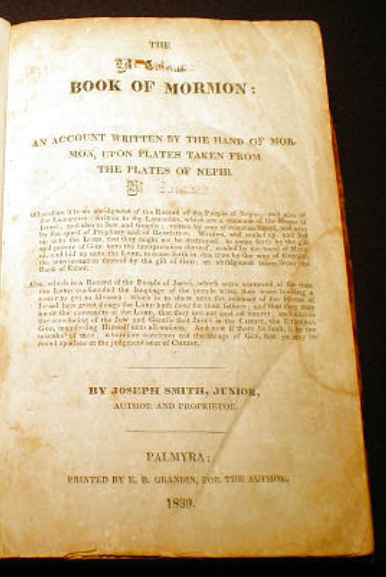
2016 Gospel Doctrine- Recommended Resources on the Book of Mormon (updated)
As with the Old and New Testaments, here are my suggestions for this year’s study of the Book of Mormon. (Edit for newcomers: Who am I and why do my suggestions have any merit?)
-
On Ben Carson’s Adventism, Creationism, and the Bible
I wrote a piece at ReligionandPolitics today about how Ben Carson’s SDA beliefs put him close to the source of creationism. Please give it a read. Ronald Numbers, eminent historian of science, creationism, and Seventh-day Adventism offered useful critique of an earlier draft, my thanks to him. There were a few questions I wanted to address beyond…
-

SMPT Teaser: A Close Reading of Alma 32
I’m presenting this Saturday at the conference in Provo. I’ve kicked some of these ideas around for a while, but only started work on them in earnest recently. I’m addressing conceptions of faith and knowledge in Alma 32 through close reading. For me, that process entails creating a bibliography to see what’s been done, and working…
-

The KJV and the Thereofs Thereof
The KJV is archaic and foreign today, but did you know it was already archaic and outdated when it was published in 1611? The translation team was instructed to follow earlier translations like The Bishop’s Bible (1568) and only change where they thought necessary. But the Bishop’s Bible was itself a revision of yet earlier…
-

The JST, Moses, and the Flood in Seminary: How Much complexity?
I happened to sit in on an early morning Seminary class today, working on Moses 8. I haven’t been in a Seminary class since I graduated high school, which was… a while ago. But I noticed something that went completely uncommented on by the manual, that I could see.
-
Quotes of Note- Elders Ballard and Packer on Meetings
(I was trying to find President Packer’s statement about meetings for second post on 1 Corinthians, and realized it had disappeared from LDS.org. I’ve relocated it on the Wayback Machine, and the link below is correct. The source is no longer a “recent address” so it had disappeared from lds.org) Elder Ballard- “Are you using the…
-

Teaching Old Testament for Seminary
You recently got called as a Early Morning Seminary teacher, and feel surprisingly sanguine about it. Then you found out that you’re starting with Old Testament this September, and all of a sudden, your confidence in the face of world-weary, eye-rolling teenagers plummeted. Why is this so tough? The audience is hostile and sleepy. You teach every…
-
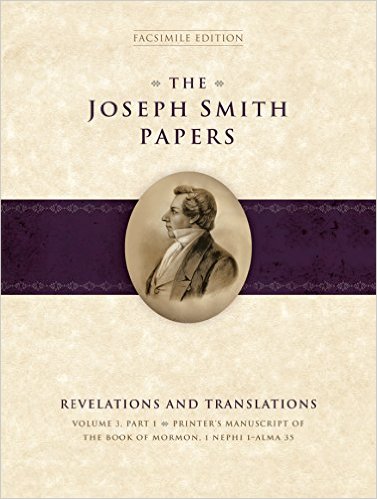
Another View of the Seer Stone
Yesterday by invitation, I attended the first known joint press conference between the LDS Church and its cousin, the Community of Christ (formerly known as the Reorganized Church of Jesus Christ of Latter-day Saints Reorganized Church of Jesus Christ of Latter Day Saints, or RLDS.) The occasion was the release of the 2-part 3rd volume in…
-
Revisiting President Packer on “Scientific Neglect” and Meetings
Given that my studies have involved the interpretation of Genesis, science, and evolution, Elder Packer and I have not always seen eye to eye. I remember well on my mission when Time Magazine ran the cover article about Mormon finances. This made it all the way to France, where we had a copy, and my companion Elder…
-

C.S. Lewis on Inspired Adaptation and Myth
I wrote recently that there’s no reason why God, who spoke to ancient Israelites “in their weakness, after the manner of their language” could not adapt familiar myths so “that they might come to understanding” (D&C 1:24.) Here, I cite that prophet-with-a-small-p “Elder” C.S. Lewis, who argues that inspiration can include adaptation of uninspired sources.
-

How the New Perspective on Paul Illustrates the Science-Religion Creation Debate
(As with many of my posts, this is kind of trying things out, thinking them through in public and on the fly. It’s messy, so I welcome thoughts and substantive corrections.) In order to keep track of my research, I’ve been making a timeline of three kinds of events relevant to our understanding of Genesis:…
-
Harnessing Fresh RM Enthusiasm to Train Future Leadership
It’s a truism that lots of people read few books. And certainly as we get married, have jobs, kids, responsibilities, many of us find our leisure time is spent simply recovering from the day and picking cheerios out of the carpet. Moreover, lots of people who DO read just don’t have interest in history, doctrine, or scripture…
-
Guest Post- Taking Six Years to Teach the Book of Mormon
This post comes from Mom S. Over the last six years, we’ve had many conversations about the relevant books she was reading, questions that arose, and teaching ideas. I asked her to share some thoughts on this class and its effects. Some time ago, I was asked to teach an adult scripture class in our…
-
On Conflation; or, Throwing the Baby Out with the Bathwater in 1911
Oftentimes, we’re presented with what appears to be a package deal: If you accept A, you accept B-G as well. If you reject A, you reject B-G as well. Just as often, however, what appears as a package can and should be unpacked, critically and carefully examined to see if it really is so. In…
-

NT Wright on Genre and Reading
One of the themes I’ve explored repeatedly in talking about Genesis and Bible interpretation in general is that of genre, and the necessity of recognizing the genre of the material we’re reading. Today I came across a easy-to-understand analogy for this.
-
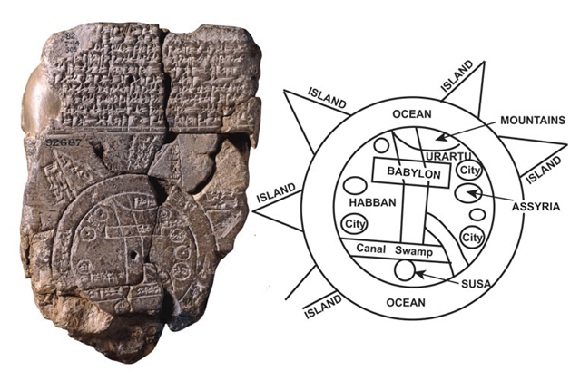
Initial Short Speculation on Three Book of Mormon Passages and Ancient Cosmology
Part of writing a book about ancient cosmology and Genesis 1 is… reading lots about ancient cosmology and Genesis 1. In doing so, I’ve had some thoughts about three Book of Mormon passages. I’ve generally set these on the shelf, so these are initial thoughts which upon further investigation may turn out to be highly significant or completely…
-
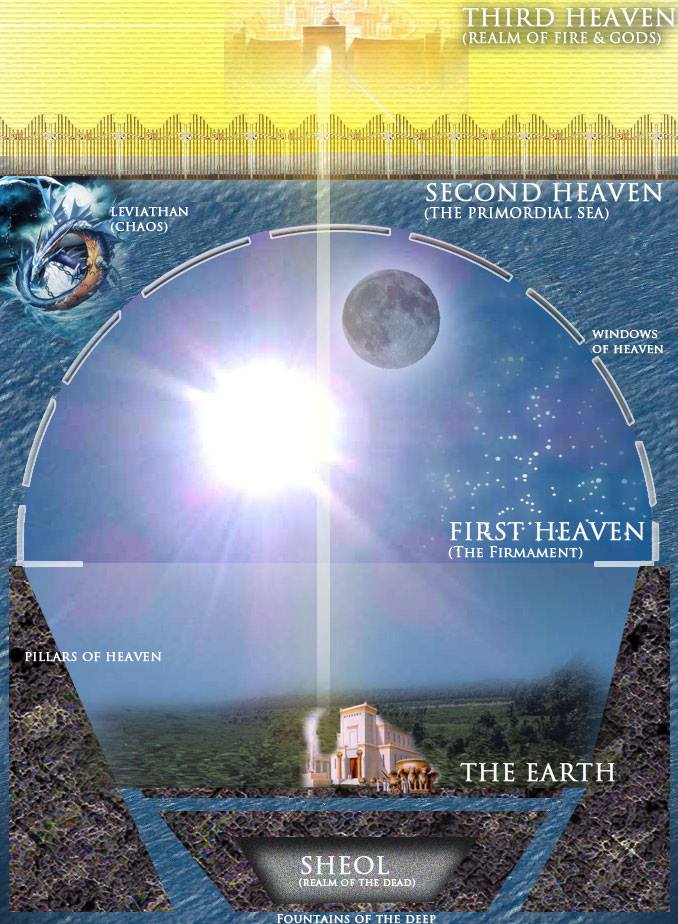
Genesis- Various thoughts and notes on a Saturday night.
The new Seminary manual on the Old Testament approaches the authorship of Genesis in a reductive and simplistic way. (HT: David Tayman, who also did the Israelite cosmology art below.) Ask students if they know who wrote the first book in the Bible. After they respond, invite them to turn to Genesis 1 and look in…
-
Taking Control of Your Gospel Doctrine Class… Because You’re the Teacher
I’ve wondered how much blame for “uninformative” (Pres. Kimball’s description) or “uninspiring” (Elder Holland’s paraphrase) teaching in Gospel Doctrine comes from collective failure. Yes, a good teacher can do wonders, but if many classes don’t really talk about the scriptures in question, it’s because virtually no one but the teacher has read them.
-
Recommended NT Resources, part 3: History and Commentary
(Cross-posted at Benjamin the Scribe.) First, Amazon is offering 30% off any physical book you buy for the next two days, by entering HOLIDAY30 at the checkout. Great time to pick up that hardcover Jewish Study Bible, Jewish Annotated New Testament, NRSV, or similar “expensive” hardcover you can’t get otherwise. Amazon link to the details. Short list.…
-

Short Musings on the Wu-Tang Clan, Ezekiel, and Church Curriculum
Yesterday at a restaurant with my parents, I heard a nice bluesy instrumental over the audio system. I’m a blues fan, and liked it so much I flagged down the waitress to ask what it was. She went to check, and reported to our mutual surprise, that that particular song was “Slow Blues” by the Wu-Tang…
-
Reading and Writing (Genesis): Books, books, and more books
I have a few things in my way before being able to work full-time on Genesis 1– a recalcitrant article draft, some travel, volunteer work, etc. In the meantime, I’m making slow but good progress. I’m beginning to suspect the most important parts of the book will be the first two sections dealing with groundwork/assumptions and…
-
Constructive Thoughts on the Curriculum Shift
As I’ve stopped hyperventilating over the leak of this forthcoming change, I’ve had some thoughts. I have a general rule when I’m in Gospel Doctrine that I try not to say anything unless it’s constructive (or the teacher says something really flagrantly crazy/wrong, which is rare in my experience.) Let me open with this positiveness, then.…
-

Recommended NT Resources part 2: General and Reference (updated)
Many of these can be purchased in paper, kindle, or from Logos or Accordance. (I’m a big Logos user.) As with all my recommendations, take them with a grain of salt. I neither fully endorse nor vouch for everything said in these, but you will certainly learn and grow by reading them. Samples are often available…
-
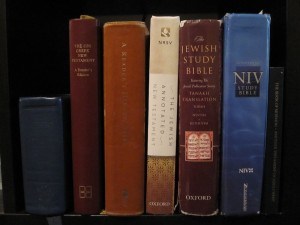
Recommended NT Resources, Part 1: Translations, Text, and the Bible in General
(Cross-posted at Benjamin the Scribe) We’re 80% of the way through our Old Testament, and the time has come to start looking forward. As I did for the Old, so I will do for the New. This time, I’ll break it up into a few posts, probably a few weeks apart. (Part 2, Part 3 are…
-

The Hypothetical “Missionary Library”
As a companion piece to Dave’s post on missionaries, let’s talk about the approved missionary library. I have concerns about what missionaries study, know, and teach. The typical missionary develops far more motivation to read and study “the literature of the Church” than before the mission, but is far more restricted, although mission presidents have leeway to relax…
-

-
Faith, Revelation, and Jewish Parallels
Some Jewish reading recently has triggered some LDS thoughts and parallels. I jotted these down between lengthy organic chemistry homework sessions, so they’re less refined than I’d like, but still important to get out there. (I’m trying to shed my perfectionist writing tendencies.) James Kugel is an insightful and approachable Hebrew Bible scholar. He’s also…
-
What are the best Ensign articles?
We have four missionaries in our ward, with ipads. They have complete access to the LDS.org library, but (per their mission president’s wishes) little else in terms of reading/enrichment material. I keep mentioning different books, as is my wont (see here, here, and here), and telling them “all you need to do is read,” so…
-
An Offhand Apologia of Sorts, and some Reflections
I exchange emails with a good number of LDS people. Some of them are simply looking for information, a pointer to the right article or scripture or background. Some of them are finding their spiritual footing to not be as firm as it used to be, which is highly disconcerting. No one enjoys just trying…
-

Mormon Appropriation of Fundamentalism and Its Outcomes (u)
The last post I whipped off quickly and in frustration was surprisingly well-received. This post was similarly written, and may require editing. Update: I have good reason to believe that the Ensign article in question did not and definitely does not fully reflect its author’s position. This post is not about the author, nor even…
